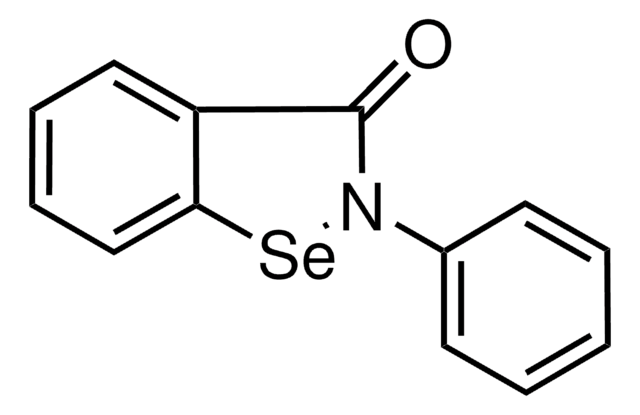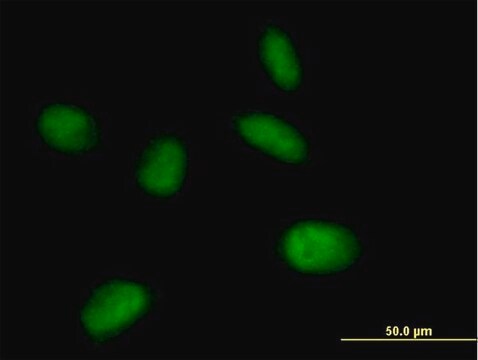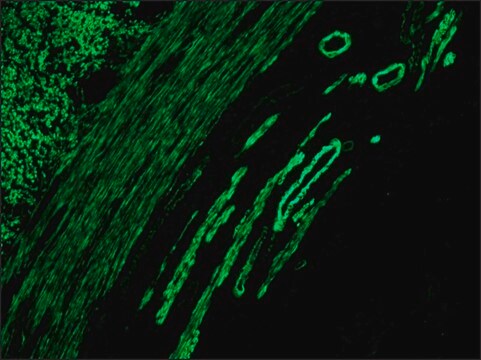F2266
Anti-Mouse IgG (whole molecule) F(ab′)2 fragment–FITC antibody produced in sheep
affinity isolated antibody, buffered aqueous solution
Iniciar sesiónpara Ver la Fijación de precios por contrato y de la organización
About This Item
Productos recomendados
origen biológico
sheep
conjugado
FITC conjugate
forma del anticuerpo
affinity isolated antibody
tipo de anticuerpo
secondary antibodies
clon
polyclonal
Formulario
buffered aqueous solution
técnicas
direct immunofluorescence: 1:128
temp. de almacenamiento
2-8°C
modificación del objetivo postraduccional
unmodified
¿Está buscando productos similares? Visita Guía de comparación de productos
Descripción general
IgGs are glycoprotein antibodies that regulate immunological defense mechanisms such as phagocytosis and inflammatory responses . Mouse IgGs have four distinct isotypes, namely, IgG1, IgG2a, IgG2b, and IgG3. IgG1 regulates complement fixation in mice . Anti-Mouse IgG (whole molecule) F(ab′)2 fragment-FITC antibodies are specific for mouse IgG subclasses G1, G2a, G2b, and G3 and do not react with serum proteins in rat.
Inmunógeno
Mouse IgG
Aplicación
Anti-Mouse IgG (whole molecule) F(ab′)2 fragment-FITC antibody is suitable for use in flow cytometry, immunohistochemistry, indirect immunofluorescence, and immunohistochemistry .
Applications in which this antibody has been used successfully, and the associated peer-reviewed papers, are given below.
Immunohistochemistry (1 paper)
Immunohistochemistry (1 paper)
Otras notas
Antibody adsorbed with rat serum proteins.
Forma física
Solution in 0.01 M phosphate buffered saline, pH 7.4, containing 1% bovine serum albumin and 15 mM sodium azide.
Nota de preparación
Adsorbed to reduce background staining with rat samples.
Cláusula de descargo de responsabilidad
Unless otherwise stated in our catalog or other company documentation accompanying the product(s), our products are intended for research use only and are not to be used for any other purpose, which includes but is not limited to, unauthorized commercial uses, in vitro diagnostic uses, ex vivo or in vivo therapeutic uses or any type of consumption or application to humans or animals.
¿No encuentra el producto adecuado?
Pruebe nuestro Herramienta de selección de productos.
Código de clase de almacenamiento
10 - Combustible liquids
Punto de inflamabilidad (°F)
Not applicable
Punto de inflamabilidad (°C)
Not applicable
Elija entre una de las versiones más recientes:
¿Ya tiene este producto?
Encuentre la documentación para los productos que ha comprado recientemente en la Biblioteca de documentos.
M C Gómez et al.
Reproduction in domestic animals = Zuchthygiene, 47 Suppl 6, 130-135 (2013-01-04)
Somatic cell nuclear transfer offers the possibility of preserving endangered species including the black-footed cat, which is threatened with extinction. The effectiveness and efficiency of somatic cell nuclear transfer (SCNT) depends on a variety of factors, but 'inappropriate epigenetic reprogramming
P Robin et al.
Cell motility and the cytoskeleton, 28(1), 34-44 (1994-01-01)
The role of microtubules in the exocrine secretory process is not yet well established, and their disruption by anti-microtubule drugs leads to variable effects on intracellular transit and protein secretion. We investigated the involvement of microtubules in the regulated secretory
Y Yan et al.
Journal of immunology (Baltimore, Md. : 1950), 166(8), 5258-5264 (2001-04-06)
Donor leukocytes play a dual role in rejection and acceptance of transplanted organs. They provide the major stimulus for rejection, and their removal from the transplanted organ prolongs its survival. Paradoxically, administration of donor leukocytes also prolongs allograft survival provided
C M Newman et al.
Arteriosclerosis, thrombosis, and vascular biology, 15(11), 2010-2018 (1995-11-01)
Osteopontin (OP) is a secreted glycoprotein that contains the Arg-Gly-Asp (RGD) cell-binding sequence that binds calcium and is chemotactic and adhesive for rat vascular smooth muscle cells (VSMCs). OP gene expression is upregulated in cultured rat VSMCs in vitro and
Sambit K Nanda et al.
The Journal of experimental medicine, 208(6), 1215-1228 (2011-05-25)
The protein ABIN1 possesses a polyubiquitin-binding domain homologous to that present in nuclear factor κB (NF-κB) essential modulator (NEMO), a component of the inhibitor of NF-κB (IκB) kinase (IKK) complex. To address the physiological significance of polyubiquitin binding, we generated
Nuestro equipo de científicos tiene experiencia en todas las áreas de investigación: Ciencias de la vida, Ciencia de los materiales, Síntesis química, Cromatografía, Analítica y muchas otras.
Póngase en contacto con el Servicio técnico








